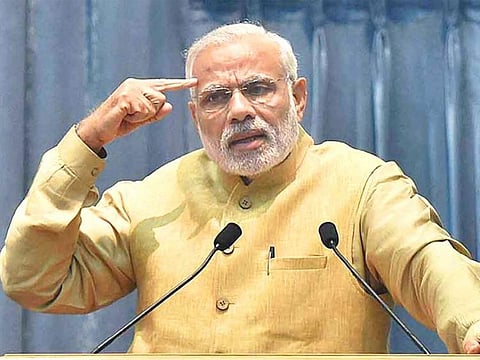India's BJP set to lose state election adding to Narendra Modi's woes
BJP set to lose control of Jharkhand as CAA protests against CAA rage across country

India's Prime Minister Narendra Modi's political troubles deepened with his Bharatiya Janata Party set to lose control of the mineral-rich eastern state of Jharkhand in poll results out Monday.
The results come as the government struggles to contain growing nationwide protests against a new federal religion-based citizenship law that's seen at least 24 people killed in clashes between police and demonstrators.
The poor showing will add pressure on the government as it presides over an economy that's growing at its slowest rate in six years and with unemployment running at the highest in four decades.
Sweeping majority
Still, Modi commands a powerful position across India after returning for a second term in May with a sweeping majority, which he has used to implement the more hardline aspects of his party's Hindu nationalist agenda. Equity investors have largely shrugged off the increased protests, with the benchmark S&P BSE Sensex hitting record highs even as worries build that a rising death toll could eventually hurt the economy.
Since his re-election, Modi's government has quickly pushed through the abrogation of Kashmir's special autonomous status in August. By December, the contentious citizenship amendment bill became law. At the same time, Modi has encouraged companies to invest and called for changes to the country's labour laws.
Although the final tally has not been released, leads from India's Election Commission indicate the BJP - which currently rules the state - was ahead in 26 seats, well short of a clear majority in the 81-member state assembly. The opposition alliance of the Jharkhand Mukti Morcha, the Congress party and other regional groups led in 46 seats. The remaining seats were led by other regional parties.
'Aura of Invincibility'
"A narrative could now start building against the invincibility of the BJP, health of the government and the popularity of Modi," said Rahul Verma, a researcher at Delhi-based Centre for Policy Research who has written a book about ideology in Indian politics. "Every election that the BJP loses gives some respite to its political opponents. A win in a mineral-rich state like Jharkhand, just like the one in rich Maharashtra, will by default add to the opposition parties' psychological and monetary resources to fight elections."
Despite a sweeping victory in national elections in May, Modi and the BJP have faced a tougher-than-expected battles in the state polls that have followed.
The Jharkhand results come after the Maharashtra and Haryana assembly polls in October, where the BJP fell short of a clear majority. In Haryana, a BJP-led coalition eventually formed the government for second time, but the party lost control of country's richest state Maharashtra - home to the financial capital Mumbai - after a falling out with its regional partner, the Shiv Sena.
In March 2018 the BJP and its allies together controlled 20 states. After losing Jharkhand, that number will come down to 15, hindering Modi's efforts to attract foreign investment and revive the slowing economy.
Widespread protests
The poll results come as the government faces widespread anger against a new citizenship law it pushed through Parliament on December 11. The new law bars undocumented Muslims from the neighboring countries of Afghanistan, Pakistan and Bangladesh from seeking citizenship while allowing people of other faiths to do so. The protests first erupted in the eastern Assam state where there are fears of an influx of migrants from neighboring Bangladesh.
Since then the protests have swept across the country with thousands decrying the new law as discriminatory. There are also fears that when joined with a national citizens registry the government had promised, the citizenship law will be used against India's Muslim minority.
The government has imposed curfew-like conditions and implemented mobile internet connections across many parts of the country to try and end the demonstrations but to little effect.
The protests represent the single biggest challenge Modi has faced in his six-year rule. On Sunday he tried to calm fears about the citizenship law and distance his government from its promise of a national citizens registry.
"The cost of the citizenship law to the BJP is increasing," Narendar Pani, a political economist and professor at the Bengaluru-based National Institute of Advanced Studies," said, noting the BJP's "poor handling of the economy" was also a factor.
Sign up for the Daily Briefing
Get the latest news and updates straight to your inbox


